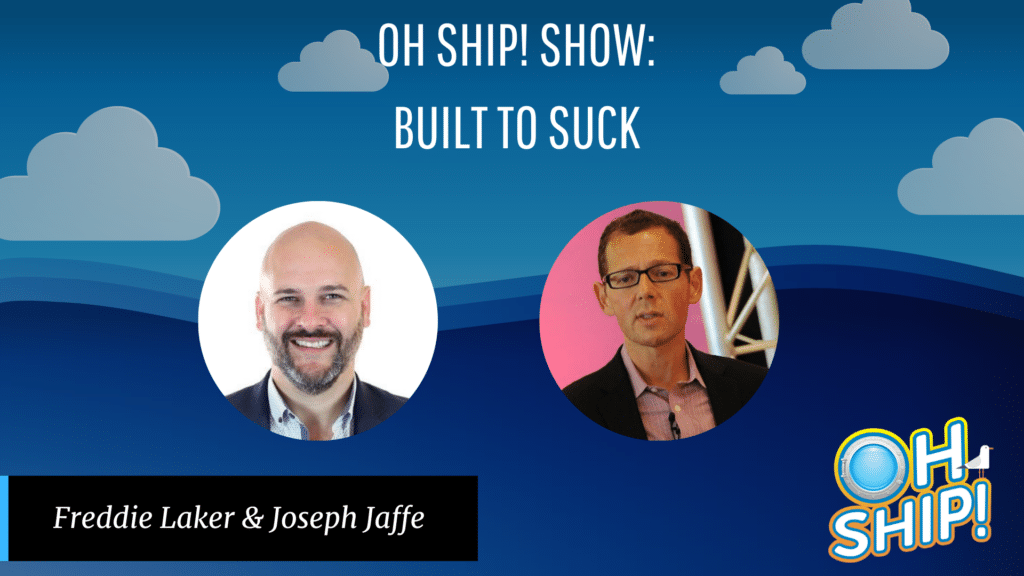Hear Joseph’s take on why corporate dynasties are destined to crumble.
Joseph Jaffe is a visionary thinker and entrepreneur who hosts Corona TV and has written five books, including Built to Suck, which he wrote about a year before the pandemic. Its premise is that we’re living through the demise of the corporate era, and major changes are afoot. We spoke with Joseph about how his predictions have held up over the massive transformation of the past year and how he expects the business landscape will continue to evolve in astounding new ways.
Why the big business model is broken
“Today, companies, corporations, and big brands are not built to last; they’re built to suck,” Joseph says. “The business model of big business is broken. Why? Because the very thing that helped them grow—which was size, scale, economies of scale, efficiencies of scale, being a global network—is now the albatross around their neck. They’ve become too big, too slow, too siloed, too political, too dysfunctional; they are slowing down while the world is speeding up.”
According to Joseph, the four horsemen of the corporapocalypse are size, age, being a public company, and culture. Because public companies are locked into a model that prioritizes quarterly earnings, they’re forced to think in the short-term rather than the long-term.
He was struck with this idea while looking at a map of failed dynasties in his daughter’s classroom. “I thought to myself, if the corporation were an empire, or a dynasty, or a civilization, how arrogant are we, how hubristic are we, to believe that it, too, would somehow cheat the sands of time,” he says.
He recalls how just before his book came out, Jeff Bezos called an all-hands meeting to tell people that one day, they’d go bankrupt, and their job was to delay that for as long as possible. This validated everything Joseph was saying.
Joseph maintains that the predictions made in his book have proven correct through the pandemic, as we’ll see now.
How COVID influenced this trajectory
COVID itself accelerated the inevitable, Joseph says. The organizations that were already doing well have turned out fine; the ones on bad footing are trying desperately to survive.
The value of catharsis
Joseph’s book doesn’t pull punches, but it’s not about the death of the corporate sphere; it’s about embracing the truth of what the future will hold.
Digital disruption is a central pillar of growth, Joseph asserts—and COVID brought that disruption in spades.
When a shock to the system occurs, entrepreneurs must ask if they are prepared to risk putting themselves out of business trying something that might work. “It’s only by doing that and going to that point of death that rebirth can occur,” Joseph says.
Moreover, the death of individual corporations isn’t necessarily a bad thing, he asserts. “There should be term limits for corporations,” Joseph continues. At that point, one of the “3 Ds” should occur: They should be dissolved, dissected, or disrupted (meaning reinvented), which can ultimately make them more beneficial to society.
That’s partly because today, people increasingly feel that corporations should be satisfying all stakeholders, not just shareholders. The emphasis on regenerative capitalism and conscious capitalism has been growing steadily. Many direct-to-consumer startups like Toms Shoes, Bombas, and Warby Parker are building philanthropy and vision for social change into their core business model, which is tough for large existing corporations to do. “It’s hard to retrofit strategy, and it’s also hard to retrofit revenue, but it is a survival tactic right now. It is imperative for survival,” Joseph says.
“We are witnessing and living through the demise of the corporate empire, but we are also witnessing maybe the fifth industrial revolution, which is the entrepreneurial revolution,” he continues. “It’s the spirit of small business that burns bright.”
How the pandemic changed his life
Joseph introduced Corona TV after the pandemic began, hosting the web show five days a week. Before the pandemic, he worked as a consultant and keynote speaker who had spoken in 50 countries. As he saw his existing revenue streams draining away during quarantine, he made a sharp course correction. “I just instinctively did what I knew how to do, which is to create content and also to want to help people that were less fortunate than myself,” he says.
He immediately loved the connection with the community that becoming a “streamy” brought. “It has just brought joy to my life,” he says. Bringing clients on as guests has also helped him truly understand them on a deeper level.
As a podcast or web show host, it’s vital to think in the long term, Joseph says. He’s done 200 episodes so far, but he’s only 50% of the way into the two-year period it takes to really become established. He takes inspiration from Joe Rogan, who did 1,550 episodes before selling his show to Spotify.
“I make mistakes all the time,” he says. In the beginning, that was harder to accept. “I’m my own worst enemy; I’m a perfectionist,” he continues. “When I had a bad show, or there was a technical difficulty, I just wanted to bang my head against the wall. And now, I’ve learned how to forgive myself. And my lesson as a creator now is, if you don’t have a bad show, how on earth are you ever gonna know what a good show is?”
Most importantly, the pandemic helped him pivot into work that made him truly joyous, as well as experimenting with positive life changes like meditation, sleeping better, and exercising. “I’m just mixing it up,” he says.
He wants to do a keynote and possibly a book on how he reinvented himself during the pandemic and the wisdom he gleaned from the experience: “Love what you do, be true to yourself, and stay the course.”
Envisioning the future
Joseph envisions corporate training taking the form of engaging shows with hosts, guests, and comments. Rather than creating Zoom fatigue, they’d draw the audience in and keep them deeply focused.
He also envisions a world in which creators and brands have their own currency, which could provide access that “regular” currency can’t.
“Things change slowly, and then they change instantly and overnight,” he says. “If there’s one message to executives or brands out there, it’s ‘don’t be a spectator.’ Don’t sit on the sidelines and wait for someone else to make the first move. Roll up your sleeves and actively experiment.”
While large corporations focus on risk mitigation, governance, and best practices, budding entrepreneurs have endless options for exercising their creativity. “All you have to do is dream and be prepared to be wrong, or to fail, or to pivot, or to course-correct,” says Joseph. “That is our gift—our gift is to be an absolute, limitless dreamer right now.”





